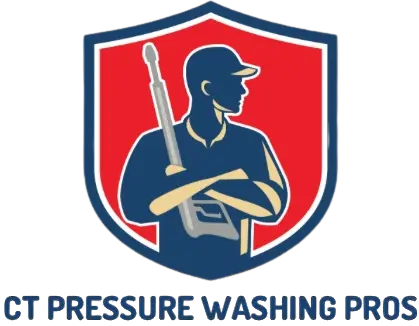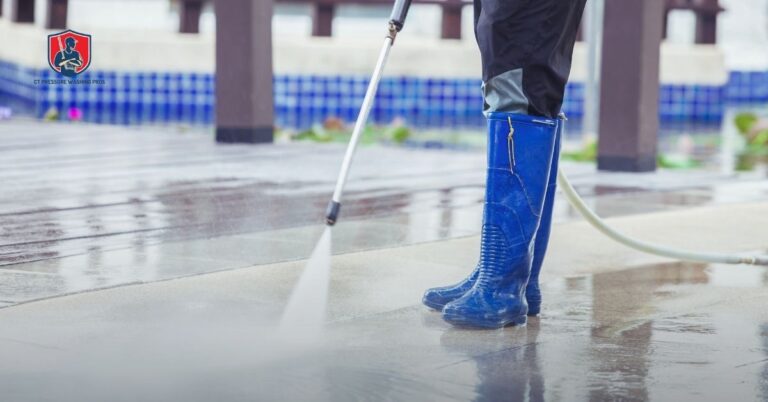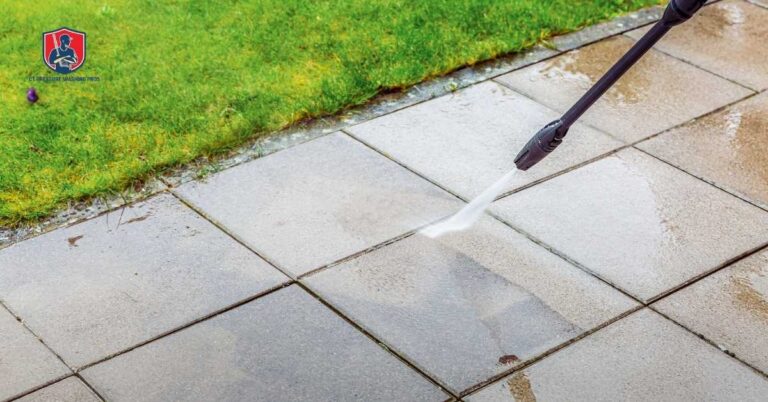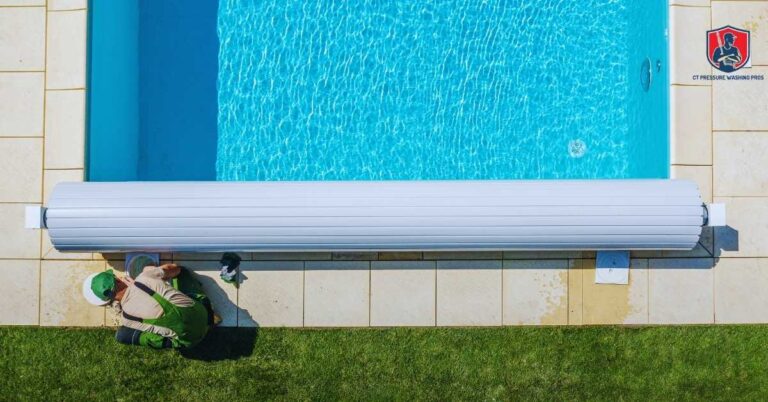Power washing is a fast and effective way to clean driveways, patios, and decks, but if you have pets, there’s one big question: Is the soap safe for them? After all, once the water dries, the residue stays, and curious pets sniff, walk, and sometimes lick surfaces without a second thought.
Many homeowners assume that if a cleaning product is biodegradable or eco-friendly, it’s also safe for pets. But that’s not always the case. Some soaps contain chemicals that might not harm concrete or wood but can irritate a pet’s paws, skin, or stomach if ingested. Even certain “natural” ingredients can be unsafe for animals.
So, should you worry when using power washing soap? The short answer: it depends on the type of soap you use and how well you rinse the area. Some cleaners break down quickly and won’t cause harm, while others can leave behind residues that might be harsh on your pet’s paws or digestive system.
In this guide, we’ll break down what’s in power washing soap, how it can affect pets, and what you can do to make cleaning safer. Whether you have a dog that loves rolling around outside or a cat that strolls across the patio, knowing what’s left on the ground after washing can make all the difference.
Table of Contents
Understanding Power Washing Soap and Its Ingredients
Power washing soap is a cleaning solution designed to break down dirt, grime, mold, and grease on outdoor surfaces. Unlike regular soap meant for skin or household cleaning, power washing detergents contain ingredients that help lift tough stains and rinse away more effectively.
Think of it like washing dishes—hot water alone helps, but adding soap cuts through grease. Power washing works the same way. The pressure removes loose dirt, but the soap breaks down deep stains, oil, and mildew that water alone can’t handle.
How Power Washing Soap Differs from Regular Soap
At first glance, soap is soap, right? Not exactly. Regular soaps, like dish soap or hand soap, are made to be gentle and rinse off easily. Power washing detergents, on the other hand, are made to stick to surfaces longer, penetrate grime, and sometimes even kill bacteria or algae.
Biodegradable soaps break down naturally into harmless components. These are often safer for plants, pets, and the environment. Many pet-friendly options fall into this category.
Non-biodegradable soaps contain chemicals that don’t break down as easily. They can leave residues that may harm animals, especially if a pet licks or steps on a freshly cleaned area. These are usually stronger and meant for industrial or commercial cleaning.
The key difference is strength and purpose—one cleans hands, the other cleans driveways.
So, if you have pets, choosing a biodegradable, pet-safe soap and rinsing thoroughly can make all the difference.
Common Ingredients in Power Washing Soap
Power washing soaps vary, but most contain a mix of these ingredients:
- Surfactants – These are the main cleaning agents that lift dirt and grease. They work by reducing water’s surface tension, allowing it to spread and soak into grime. Think of them like tiny magnets pulling dirt away from the surface.
- Builders (like phosphates or citrates) – These help soften hard water and boost the effectiveness of surfactants. Some are eco-friendly, while others can be harsh on plants and animals.
- Bleaching agents (chlorine or oxygen bleach) – Used in some formulas to whiten surfaces and kill mold or algae. These can be harmful to pets if not rinsed properly.
- Solvents (alcohols or glycol ethers) – Help dissolve grease and oil stains. These are found in heavy-duty cleaners and may be too strong for pet-friendly areas.
- Fragrances and dyes – Added for scent and appearance, but can sometimes cause allergic reactions in pets.
How Power Washing Soap Affects Pets When on the Ground
Power washing makes outdoor spaces look fresh, but what happens when soap-covered water soaks into the ground or dries on surfaces? If you have pets, this can be a problem. Dogs and cats explore with their paws and noses, sometimes licking the ground. The wrong soap can cause skin irritation, stomach problems, or even breathing issues.
Contact with Paws and Fur
Pets step, sniff, and roll around outside. If soap residue stays on surfaces, it can stick to their paws and fur. Strong detergents or chemicals like bleach can dry out skin, cause itching, or even chemical burns.
Now imagine a pet licking irritated paws—they’re not just dealing with discomfort, they’re also swallowing whatever’s left on the ground. That’s where things can get worse.
Ingestion Risks from Licking
Most pets groom themselves by licking their paws. If they step on a freshly cleaned driveway, they could end up swallowing leftover soap. Some detergents contain phosphates or solvents that upset the stomach, leading to drooling, vomiting, or diarrhea. The stronger the soap, the bigger the risk.
Breathing in Soap Residue
Power washing sprays tiny particles into the air. Pets don’t have to touch the ground to be affected—just inhaling the mist can irritate their nose, throat, or lungs. This is especially dangerous for pets with breathing problems like asthma.
Are Power Washing Soaps Safe for Pets?
The short answer? Some are, and some aren’t. It all depends on what’s in the soap and how well you rinse the area. Some formulas are designed to break down naturally and pose little risk, while others contain chemicals that can irritate skin, upset stomachs, or cause breathing issues if inhaled.
So, how do you know which ones are safe? Let me explain.
Types of Power Washing Soaps and Their Safety Levels
Not all power washing soaps are created equal. Some are made with gentle, biodegradable ingredients, while others contain harsh chemicals meant for deep cleaning industrial surfaces. Here’s what you need to know.

Pet-Safe, Biodegradable Power Washing Soaps
If a soap is biodegradable, non-toxic, and plant-based, it’s usually safer for pets. These formulas break down naturally, leaving little to no residue. Many brands advertise “pet-safe” on the label, but always check the ingredients. Look for terms like:
- Coconut-based surfactants – These clean effectively without irritating skin.
- Citrus or vinegar-based formulas – Natural degreasers that are safer than synthetic solvents.
- Enzyme-based cleaners – These break down dirt without harmful chemicals.
Even with safe soaps, you should always rinse thoroughly to remove any leftover residue.
Harsh Chemical-Based Soaps to Avoid
Some power washing soaps contain ingredients that can be dangerous for pets. These are usually found in heavy-duty cleaners meant for removing grease, mold, or stains from concrete and industrial areas. Watch out for:
- Bleach (Sodium Hypochlorite) – Can cause burns on paws and is toxic if ingested.
- Phosphates – Harmful to aquatic life and can irritate pet skin.
- Glycol Ethers – Found in degreasers and linked to liver and kidney damage in animals.
- Ammonia – Can cause respiratory issues if inhaled.
These chemicals linger longer on surfaces, increasing the chance that your pet might step in them or breathe them in.
What Happens If Pets Are Exposed to Harmful Soaps?
Even a small amount of exposure can cause issues. Here’s what to look for:
- Skin Irritation – Redness, itching, or paw licking.
- Upset Stomach – Vomiting, drooling, diarrhea.
- Breathing Issues – Coughing, sneezing, or wheezing.
If you suspect your pet has been exposed to a harmful soap, rinse their paws immediately with water and call your vet if symptoms don’t improve.
The Safest Way to Power Wash Around Pets
Keeping outdoor spaces clean is important, but so is protecting your pets. The safest way to power wash without risking your pet’s health? Professional cleaning. Here’s why.
Why Professional Power Washing Is the Best Choice for Pet Owners
Power washing looks simple, but choosing the right soap, controlling water pressure, and ensuring a proper rinse all take experience. Using the wrong cleaner or leaving behind residue can put pets at risk. A professional knows how to get the job done without leaving harmful chemicals behind.
Here’s what makes professional cleaning safer:
- Pet-Safe Products – Experts know which cleaning solutions work best without harming animals or plants.
- Proper Rinsing – A thorough rinse is key to making sure no residue is left behind. Professionals use the right amount of pressure to clean deep without leaving chemical traces.
- Controlled Water Pressure – Too much pressure can damage surfaces, while too little may not clean properly. A trained professional finds the right balance.
The Risks of DIY Power Washing
Many homeowners grab a pressure washer, pick a soap, and start spraying without considering the effects on their pets. But DIY power washing can leave behind harsh residues, damage surfaces, and even waste water if not done correctly.
Some common mistakes include:
- Using high-chemical cleaners that aren’t pet-friendly.
- Not rinsing thoroughly, leaving behind traces that pets step on or lick.
- Overpowering surfaces, which can drive chemicals deeper into concrete or wood instead of washing them away.
A professional knows how to avoid these mistakes, giving you peace of mind that your home is safe for both your family and your pets.
Conclusion
You don’t have to choose between a spotless driveway and your pet’s safety. With the right approach, you can keep your outdoor spaces clean without exposing your furry friends to harmful chemicals.
While some power washing soaps are pet-safe, others can leave behind residues that may irritate paws, upset stomachs, or cause breathing issues. The safest option? Professional power washing. Experts use the right cleaning solutions, proper techniques, and thorough rinsing to ensure your home is clean, chemical-free, and safe for pets.
Want a deep clean without the risks? Let the professionals handle it. You’ll get the best of both worlds—a cleaner home and a safer environment for your pets.
Can my pet walk on a surface immediately after power washing?
No. It’s best to wait until the surface is completely dry and free of any soap residue. Even pet-safe soaps can cause mild irritation if not rinsed properly.
What should I do if my pet comes in contact with power washing soap?
Rinse the area with clean water immediately. If your pet licked or ingested any soap, watch for signs of vomiting, drooling, or diarrhea. Call your vet if symptoms appear.
How do I know if my power washing soap is pet-friendly?
Check the label for words like “biodegradable,” “non-toxic,” and “safe for pets.” Avoid products with bleach, ammonia, phosphates, or strong solvents. When in doubt, choose a natural cleaner or hire a professional.
Are all biodegradable soaps safe for pets?
No. Some biodegradable soaps are safe for the environment, but may still contain ingredients that irritate pets. Always read the ingredient list and research before use.




